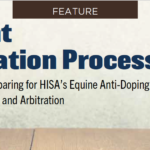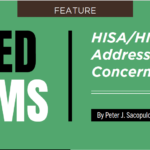Practicing Medicine in a Litigious World: Coping with Medial Legal Stress
Michael J. Sacopulos, JD
A Google search for “Medical Malpractice Lawyers” yielded 21,600 results. The search took 0.24 seconds. Phone books, radio and television advertisements all offer lawyers ready to represent people injured by “medical negligence”. While some may argue that the pace of suits against physicians is slowing, many healthcare providers feel like a target for the plaintiff’s bar.
Dr. J. Deane Waldman, a pediatric cardiologist, knows this fear and stress all too well. In 1976 he finished his second fellowship training. In his more than 30-years of practice he has been sued three times. The first two suits, nothing happened and the cases were dropped. The third suit he was sued with an eight million dollar judgment against himself and the University of Chicago for a patient he was not treating, says Dr. Waldman.
“I have stressed out over that ever since, 20 years ago, but refuse to change my practice modes,” Dr. Waldman said.
Many physicians change how they practice out of fear of being named in a lawsuit. Dr. Waldman explains a child who comes in to see their physician with a heart murmur; the physician may believe it is an innocent heart murmur. Yet, today physicians are ordering an eco-cardiogram in order to prove it is an innocent heart murmur. It is called “defensive medicine” and it is a common, expensive problem for healthcare.
“They are doing that for medical legal reasons,” Dr. Waldman said.
Another example is if a child falls off their bike and is taken to the emergency room. The physicians on staff will order a head CT. Waldman says these unnecessary tests increase the costs of healthcare around the country.
“Some of these rules you don’t want to have to follow but you do. Some of these rules are not in the patients’ best interest. We are in a place where you are supposed to follow these rules even if you think that is not the right thing for the patient. That creates a stressor, dissatisfaction, frustration for all providers,” said Dr. Waldman.
Litigation $tress
Is the fear of malpractice litigation justified in the medical community? I think so. The New England Journal of Medicine reports 19.1% of neurosurgeons and 18.9% of thoracic-cardio vascular surgeons face a claim in any given year.[1] Six out of ten physicians 55 and older have been sued according to a 2010 American Medical Association study. [2] This all adds up to a lot of medical malpractice litigation.
Not surprisingly, this litigation and the fear of it, impact physicians’ daily lives. A recent survey of orthopedic surgeons found that more than 95% said they have ordered unnecessary tests, referrals and hospitalizations simply to protect themselves from being sued. [3] The costs of defensive medicine are tremendous; some estimate $55.6 billion annually. [4] The stress physicians feel from medical malpractice litigation is real, justified and impacts how they practice medicine.
“The younger generation is less stressed out than us older people who grew up in an environment where your number one responsibility was to take care of the patient, not to satisfy the government regulations. The government regulations ought to be able to help us take care of the patient instead of beating us up over the head,” Dr. Waldman said.
The Unique Business of Healthcare
Dr. Waldman has been the head of numerous hospitals. His experience has him trained on the clinical and research side of medicine but not the business and management side. In 1997 he set out to change that by furthering his education.
“I went and got my MBA, purely for defensive reasons,” Dr. Waldman said.
Dr. Waldman found that what he was learning was applicable for improving healthcare in general and it wasn’t being used. He said he started asking questions that a normal manager of a large organization would ask himself/herself about their organization.
“Doctors and nurses are responsible for their patient, but when a doctor or nurse wants to make a decision it has to be cleared through the rules of the institution. It has to go through the process in the insurance company. Typically they won’t do what we want or it takes forever to get it done. Most doctors and nurses are frustrated that they don’t have the authority that they consider requisite with the responsibility that they have,” Dr. Waldman said.
Unfortunately, these structural issues also increase many physician’s levels of frustration and stress.
A Psychologist’s View
Michael Heitt is a licensed psychologist with a twofold practice in Baltimore, Maryland. One half of his practice deals with the typical problems, the second half deals with physicians who exemplify disruptive behavior. Too often Dr. Heitt is faced with a physician patient who acts out in the workplace because he/she is stressed. Dr. Heitt had one patient who said the reason he would yell at the staff around him was in the interest of patient safety. He would tell Dr. Heitt that his bad behavior was because his standards are higher than those of the staff.
“On the surface it sounds wonderful but when you probe deeper, part of the problem is that their standards are a bit too high and that makes them at risk of nothing being able to work with other people,” Dr. Heitt said.
Disruptive behavior can be a manifestation of a physician’s worry over getting sued. When a physician is working with someone who is less competent it can be challenging. With the ever present fear of being sued, it can amplify a physician’s actions. Counter to the physician’s ideal or goal to provide the best patient care, they are actually putting the patient at an increased risk because they are creating a hostile environment.
“People are less willing to bring possible errors to the physician’s attention because they don’t want to get chewed up and spit out,” Dr. Waldman said.
Laws Further Induce Stress
Unfortunately, the evidentiary rules used in most courts are not, helpful to relieving stress. Comments made by defendant physicians to anyone other than his/her counsel, can be repeated at trial in many states. Because of this fact, lawyers instruct their clients “not to speak to anyone about the case.” This furthers the physician’s feelings of professional isolation and stress.
“To reach out to a trusted colleague often times what you will find is that they have been down that road too. Sometimes just knowing that you are not along and that other very well respected colleagues have been down this road too can be very reassuring and normalizing,” Dr. Heitt said.
How Was Your Day at Work?
The stress of a malpractice suit for a physician is bad enough; now throw into the mix family. Since, anything physicians say to their spouse could be admissible in court, they may keep all the extra tension bottled up. Dr. Heitt typically asks the physician to bring their partner for collateral information, at least once throughout the course of their treatment.
“There have been times where I worked with a physician for a year and they refused to bring in their spouse, meaning they refused through the entire duration that they have let their spouse know they are even coming to see me. Or that they have gotten in trouble and their job is in jeopardy,” Dr. Heitt said.
This type of compartmentalize stress can be harmful to a relationship.
Plan of Action for a Very Stressful and Litigious World
The American Psychological Association offers the following steps to manage your stress:
- Understand how you stress. Everyone experiences stress differently. How do you know when you are stressed?
- Identify your sources of stress. What events or situations trigger stressful feelings? Are they related to your children, family, health, financial decisions, work, relationships or something else?
- Learn your own stress signals. People experience stress in different ways. Gauge your stress signals.
- Recognize how you deal with stress. Determine if you are using unhealthy behaviors (such as smoking, drinking alcohol and over/under eating) to cope.
- Find healthy ways to manage stress. Consider healthy, stress-reducing activities such as meditation, exercising or talking things out with friends or family.
- Take care of yourself. Eat right, get enough sleep, drink plenty of water and engage in regular physical activity.
- Reach out for support. If you continue to feel overwhelmed by stress, you may want to talk to a psychologist, who can help you better manage stress and change unhealthy behaviors.
Based off of statistics, we know that a medical malpractice action will unfortunately be visited upon most physicians or their close colleagues at some point in their career. Physicians facing a medical malpractice case should take a deep breath and try to follow the advice listed above. The litigation will pass. Finally, try to focus upon why you got into medicine in the first place. All the human improvement and relief you provide should not be marred by some litigious miscreants.
Michael J. Sacopulos is a partner with Sacopulos, Johnson & Sacopulos in Terre Haute, Indiana. He also serves as National Counsel for Medical Justice Services, Inc. His practice focuses on assisting healthcare professionals develop strategies and techniques to avoid medical liability claims. He may be reached at Mike_Sacopulos@Sacopulos.com.
This work is copyrighted and is the exclusive property of the authors. It may only be used, in whole or in part, with the express written permission of the authors.





